外研版(2019) 选择性必修第三册 Unit 2 A life's Work Developing ideas Reading 2 课件(30张)
文档属性
| 名称 | 外研版(2019) 选择性必修第三册 Unit 2 A life's Work Developing ideas Reading 2 课件(30张) |  | |
| 格式 | zip | ||
| 文件大小 | 289.2KB | ||
| 资源类型 | 教案 | ||
| 版本资源 | 外研版(2019) | ||
| 科目 | 英语 | ||
| 更新时间 | 2022-08-03 19:24:45 | ||
图片预览

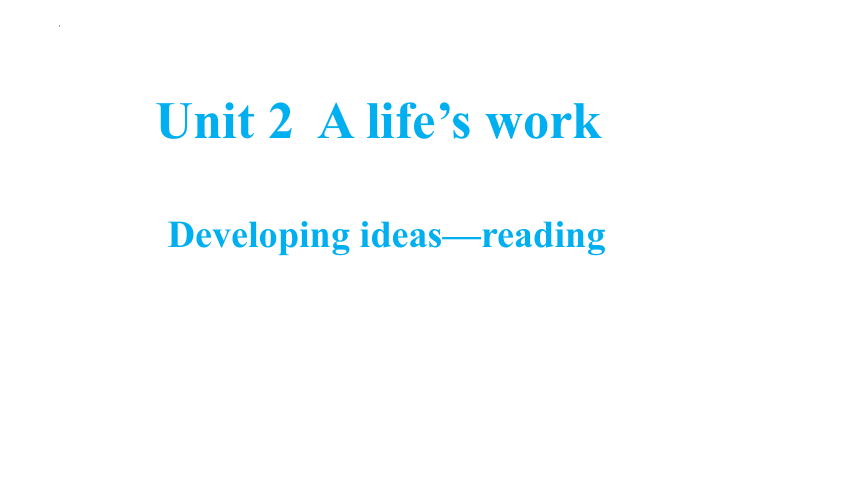
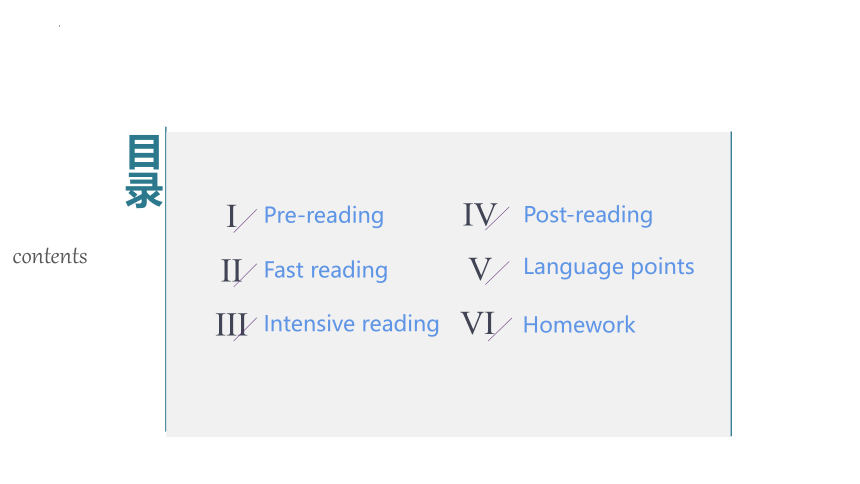

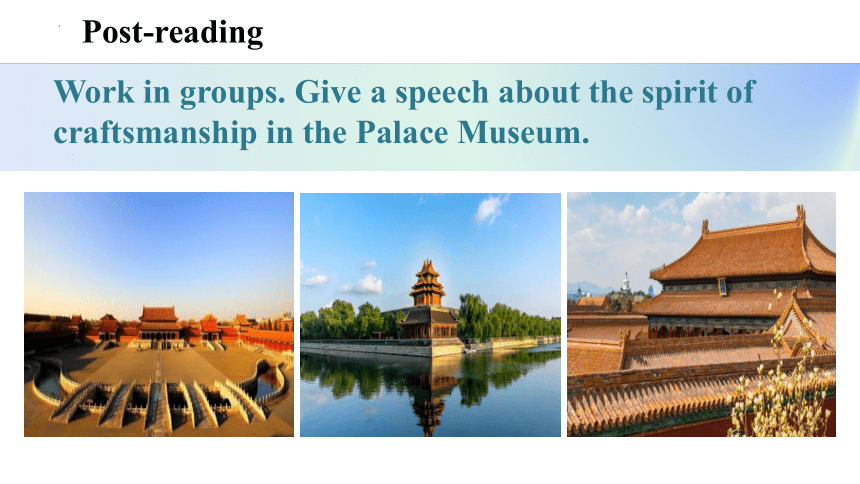


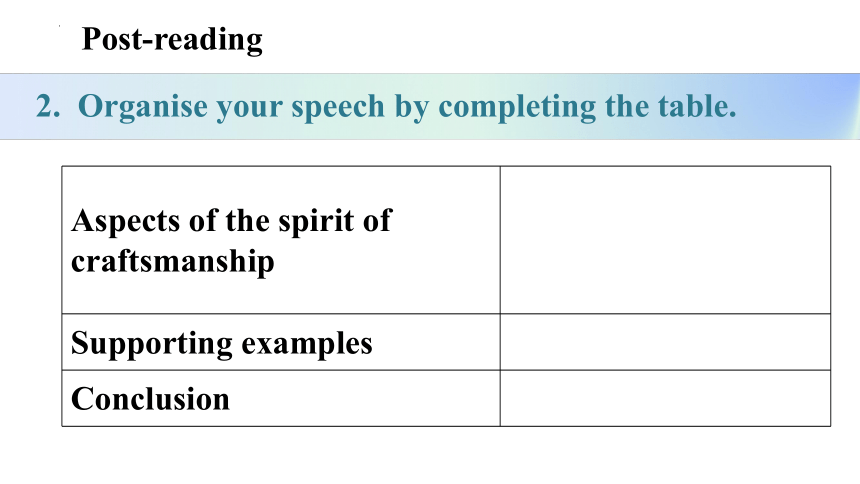
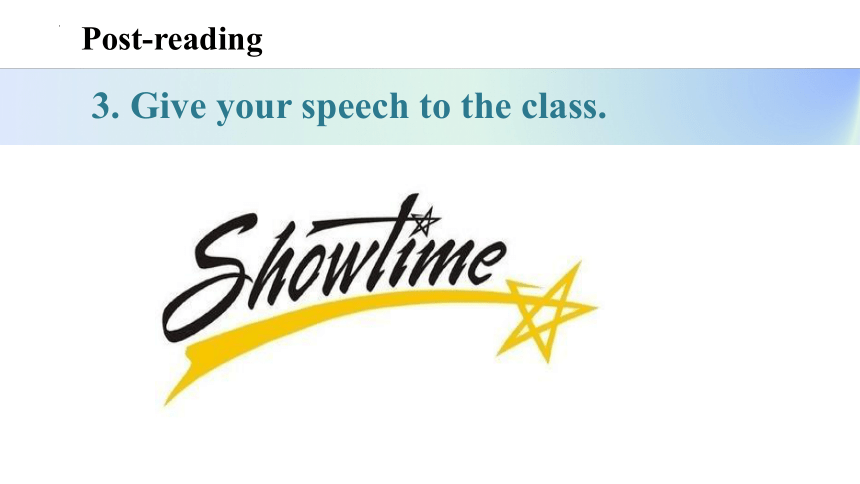

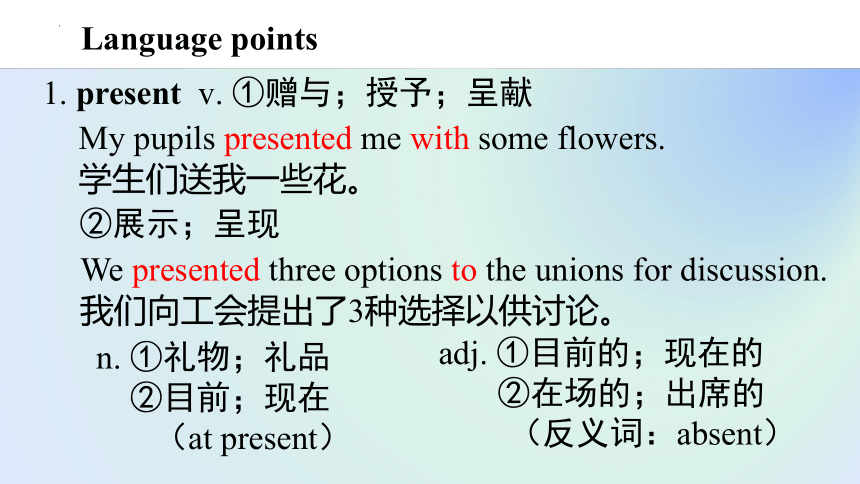
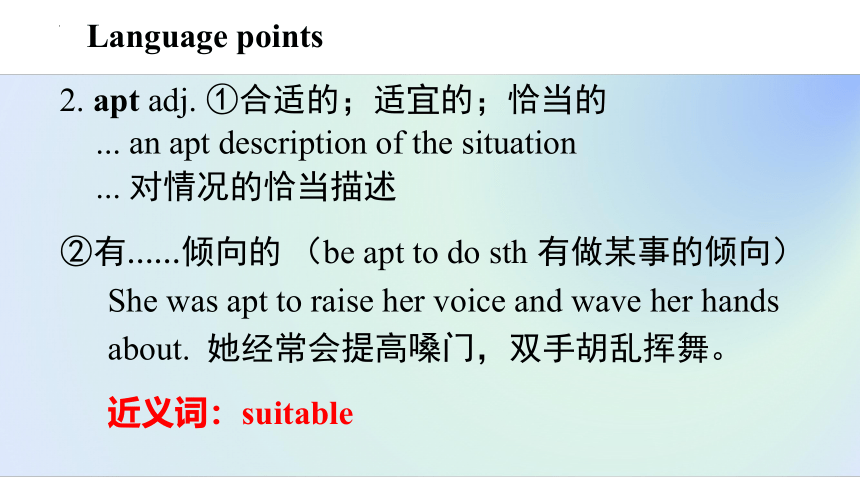
文档简介
(共30张PPT)
空白演示
单击输入您的封面副标题
Developing ideas—reading
Unit 2 A life’s work
目录
contents
Pre-reading
I
Language points
Ⅳ
Fast reading
II
Homework
Ⅴ
Intensive reading
III
Post-reading
Ⅵ
Ⅳ
Post-reading
Post-reading
Work in groups. Give a speech about the spirit of craftsmanship in the Palace Museum.
Post-reading
1. Think about other masters in the Palace Museum. Then discuss the questions within your group to prepare for your speech. Do further research if necessary.
Who are the masters
What fields do they work in
What specific examples can you give of their work
Post-reading
1. Think about other masters in the Palace Museum. Then discuss the questions within your group to prepare for your speech. Do further research if necessary.
What aspects of the spirit of craftsmanship are demonstrated through their work
How can you develop and display such spirit in daily life
Post-reading
2. Organise your speech by completing the table.
Aspects of the spirit of craftsmanship
Supporting examples
Conclusion
3. Give your speech to the class.
Post-reading
Language points
V
1. present v. ①赠与;授予;呈献
Language points
My pupils presented me with some flowers.
学生们送我一些花。
②展示;呈现
We presented three options to the unions for discussion.
我们向工会提出了3种选择以供讨论。
n. ①礼物;礼品
②目前;现在
(at present)
adj. ①目前的;现在的
②在场的;出席的
(反义词:absent)
... an apt description of the situation
... 对情况的恰当描述
2. apt adj. ①合适的;适宜的;恰当的
Language points
②有……倾向的 (be apt to do sth 有做某事的倾向)
近义词:suitable
She was apt to raise her voice and wave her hands about. 她经常会提高嗓门,双手胡乱挥舞。
1. at one’s own pace ______________________
2. regard oneself as ______________________
3. day in, day out ______________________
4. be fond of ______________________
5. originate from ______________________
6. range from ... to ______________________
按自己的节奏/速度
认为自己是……
日复一日地
源于……;发自……
Language points
(范围)从……到……
喜欢
7. even if __________________
8. neither ... nor __________________
9. remain optimistic about __________________
10. pass on ... to __________________
11. take on __________________
12. take up __________________
保持乐观
传给;传递……给……
Language points
即使;虽然
承担
开始从事
既不……也不……
1. If it hadn’t been for a three-episode documentary, outsiders would never have known that the plainly-dressed people working here are masters of their craft, who have spent their lives restoring precious antiques.
Language points
Paraphrase: Without a three-episode documentary, people outside of the Forbidden City would never have known that the plainly-dressed people who work here are masters of their craft, or that they have devoted their lives to restoring precious antiques.
If it hadn’t been for a three-episode documentary, outsiders would never have known that the plainly-dressed people working here are masters of their craft, ...
Language points
If ... hadn’t ... , ... would have 是 if 虚拟语气句型,表示与过去事实相反。
If it hadn’t been for a three-episode documentary, outsiders would never have known that the plainly-dressed people working here are masters of their craft, who have spent their lives restoring precious antiques.
Language points
that 引导宾语从句
非限制性定语从句,修饰先行词 masters
2. Among these is the clock restoration master, Wang Jin.
Language points
Paraphrase: Wang Jin, the clock restoration master is among the masters who have spent their lives restoring precious antiques.
本句使用了完全倒装的结构,即把谓语部分完全放在主语之前的倒装形式。
Translation: 这其中便包括钟表修复大师王津。
Language points
在英语中,为了保持句子平衡或强调表语部分等,将作表语的形容词、分词、介词短语、such 置于句首时,需用完全倒装,其形式为:形容词/现在分词/过去分词/介词短语/ such + be + 主语。
例如:
Happy are those who are contented. 知足者常乐。
Inside the parcel was a letter. 包裹里有封信。
Such were his words. 这就是他说的话。
3. Walking through the seven crimson gates towards his workplace, Wang Jin still regards himself as an ordinary worker in the Palace Museum, although now he is often stopped by admirers wanting their photo taken with him.
Language points
Translation: 王津穿过七重深红色的大门,走向自己的工作地点。尽管现在他经常被想和他合影的粉丝拦住,他仍然认为自己是故宫博物院的一名普通工人。
Walking through the seven crimson gates towards his workplace, Wang Jin still regards himself as an ordinary worker in the Palace Museum, although now he is often stopped by admirers wanting their photo taken with him.
Language points
现在分词结构作状语,与其逻辑主语 Wang Jin 之间为主谓关系。
现在分词结构作定语,修饰 admirers,两者间为主谓关系。
过去分词结构作定语,修饰 photo,两者间为动宾关系。
4. Given the complexity of the work and the lack of necessary materials, this means that each expert can work on a maximum of two large pieces a year.
Language points
Paraphrase: Taking the complexity of the work and the lack of necessary materials into consideration, each expert can work on two large pieces at most every year.
Translation: 工作的复杂性和必要材料的缺乏意味着每位专家每年最多只能修复两件大型钟表。
Language points
句中 a maximum of 意为“最多/大/高……”。
例如:
Given the present conditions, I think she’s done rather well. 考虑到目前的情况,我认为她干成这样就算不错了。
在本句中,given 用作介词,意为“由于、鉴于、考虑到”,相当于 taking sth. into consideration / account。
Language points
given 还可用于 given (that) ... 结构,given 为从属连词,意为“考虑到、鉴于”。
例如:
Usually, I am sensible with money, as I have to be, given that I don’t earn that much.
考虑到自己挣得不多,我通常用钱比较精打细算,这也是迫不得已。
5. Mr. Wang and his students do more than repair the clocks — they bring them back to life.
Language points
Paraphrase: When Mr. Wang and his students repair the clocks, they not only make them work again but also breathe life into them.
bring sth back to life 是固定搭配,意为“让……获得重生”。
Experts studying them hope to find the genetic secrets of the mammoth and bring them back to life. 研究猛犸象的专家们希望能破解猛犸象的基因秘密,让它们获得重生。
6. Now, after eight months of endless adjustments, the time has finally come for Mr. Wang to wind up the gigantic clocks that date back to the time of Emperor Qianlong.
Language points
Paraphrase: It took Mr. Wang eight months to adjust the enormous clocks that date back to the time of Emperor Qianlong. Now, it is time for him to wind them up.
Now, after eight months of endless adjustments, the time has finally come for Mr Wang to wind up the gigantic clocks that date back to the time of Emperor Qianlong.
Language points
wind up 意为“上紧(钟、表等的)发条”。
date back to 意为“追溯到……”,与 date from 同义。
例如:The castle dates back to / dates from the 14th century. 这座城堡建于14世纪。
注意:date back to / date from 常用一般现在时,且不用于被动语态。
7. In today’s fast-paced world, the saying that “time waits for no man” has never seemed more apt.
Language points
Paraphrase: The meaning of the saying “time waits for no man” has never seemed more suitable than it does in today’s fast-paced world.
句中“否定副词 never / not + 形容词的比较级”结构表示最高级含义。
例如:I couldn’t appreciate it more if you were to write back soon. 如果你能尽快回信,我将感激不尽。
Homework
VI
thank you
VI
空白演示
单击输入您的封面副标题
Developing ideas—reading
Unit 2 A life’s work
目录
contents
Pre-reading
I
Language points
Ⅳ
Fast reading
II
Homework
Ⅴ
Intensive reading
III
Post-reading
Ⅵ
Ⅳ
Post-reading
Post-reading
Work in groups. Give a speech about the spirit of craftsmanship in the Palace Museum.
Post-reading
1. Think about other masters in the Palace Museum. Then discuss the questions within your group to prepare for your speech. Do further research if necessary.
Who are the masters
What fields do they work in
What specific examples can you give of their work
Post-reading
1. Think about other masters in the Palace Museum. Then discuss the questions within your group to prepare for your speech. Do further research if necessary.
What aspects of the spirit of craftsmanship are demonstrated through their work
How can you develop and display such spirit in daily life
Post-reading
2. Organise your speech by completing the table.
Aspects of the spirit of craftsmanship
Supporting examples
Conclusion
3. Give your speech to the class.
Post-reading
Language points
V
1. present v. ①赠与;授予;呈献
Language points
My pupils presented me with some flowers.
学生们送我一些花。
②展示;呈现
We presented three options to the unions for discussion.
我们向工会提出了3种选择以供讨论。
n. ①礼物;礼品
②目前;现在
(at present)
adj. ①目前的;现在的
②在场的;出席的
(反义词:absent)
... an apt description of the situation
... 对情况的恰当描述
2. apt adj. ①合适的;适宜的;恰当的
Language points
②有……倾向的 (be apt to do sth 有做某事的倾向)
近义词:suitable
She was apt to raise her voice and wave her hands about. 她经常会提高嗓门,双手胡乱挥舞。
1. at one’s own pace ______________________
2. regard oneself as ______________________
3. day in, day out ______________________
4. be fond of ______________________
5. originate from ______________________
6. range from ... to ______________________
按自己的节奏/速度
认为自己是……
日复一日地
源于……;发自……
Language points
(范围)从……到……
喜欢
7. even if __________________
8. neither ... nor __________________
9. remain optimistic about __________________
10. pass on ... to __________________
11. take on __________________
12. take up __________________
保持乐观
传给;传递……给……
Language points
即使;虽然
承担
开始从事
既不……也不……
1. If it hadn’t been for a three-episode documentary, outsiders would never have known that the plainly-dressed people working here are masters of their craft, who have spent their lives restoring precious antiques.
Language points
Paraphrase: Without a three-episode documentary, people outside of the Forbidden City would never have known that the plainly-dressed people who work here are masters of their craft, or that they have devoted their lives to restoring precious antiques.
If it hadn’t been for a three-episode documentary, outsiders would never have known that the plainly-dressed people working here are masters of their craft, ...
Language points
If ... hadn’t ... , ... would have 是 if 虚拟语气句型,表示与过去事实相反。
If it hadn’t been for a three-episode documentary, outsiders would never have known that the plainly-dressed people working here are masters of their craft, who have spent their lives restoring precious antiques.
Language points
that 引导宾语从句
非限制性定语从句,修饰先行词 masters
2. Among these is the clock restoration master, Wang Jin.
Language points
Paraphrase: Wang Jin, the clock restoration master is among the masters who have spent their lives restoring precious antiques.
本句使用了完全倒装的结构,即把谓语部分完全放在主语之前的倒装形式。
Translation: 这其中便包括钟表修复大师王津。
Language points
在英语中,为了保持句子平衡或强调表语部分等,将作表语的形容词、分词、介词短语、such 置于句首时,需用完全倒装,其形式为:形容词/现在分词/过去分词/介词短语/ such + be + 主语。
例如:
Happy are those who are contented. 知足者常乐。
Inside the parcel was a letter. 包裹里有封信。
Such were his words. 这就是他说的话。
3. Walking through the seven crimson gates towards his workplace, Wang Jin still regards himself as an ordinary worker in the Palace Museum, although now he is often stopped by admirers wanting their photo taken with him.
Language points
Translation: 王津穿过七重深红色的大门,走向自己的工作地点。尽管现在他经常被想和他合影的粉丝拦住,他仍然认为自己是故宫博物院的一名普通工人。
Walking through the seven crimson gates towards his workplace, Wang Jin still regards himself as an ordinary worker in the Palace Museum, although now he is often stopped by admirers wanting their photo taken with him.
Language points
现在分词结构作状语,与其逻辑主语 Wang Jin 之间为主谓关系。
现在分词结构作定语,修饰 admirers,两者间为主谓关系。
过去分词结构作定语,修饰 photo,两者间为动宾关系。
4. Given the complexity of the work and the lack of necessary materials, this means that each expert can work on a maximum of two large pieces a year.
Language points
Paraphrase: Taking the complexity of the work and the lack of necessary materials into consideration, each expert can work on two large pieces at most every year.
Translation: 工作的复杂性和必要材料的缺乏意味着每位专家每年最多只能修复两件大型钟表。
Language points
句中 a maximum of 意为“最多/大/高……”。
例如:
Given the present conditions, I think she’s done rather well. 考虑到目前的情况,我认为她干成这样就算不错了。
在本句中,given 用作介词,意为“由于、鉴于、考虑到”,相当于 taking sth. into consideration / account。
Language points
given 还可用于 given (that) ... 结构,given 为从属连词,意为“考虑到、鉴于”。
例如:
Usually, I am sensible with money, as I have to be, given that I don’t earn that much.
考虑到自己挣得不多,我通常用钱比较精打细算,这也是迫不得已。
5. Mr. Wang and his students do more than repair the clocks — they bring them back to life.
Language points
Paraphrase: When Mr. Wang and his students repair the clocks, they not only make them work again but also breathe life into them.
bring sth back to life 是固定搭配,意为“让……获得重生”。
Experts studying them hope to find the genetic secrets of the mammoth and bring them back to life. 研究猛犸象的专家们希望能破解猛犸象的基因秘密,让它们获得重生。
6. Now, after eight months of endless adjustments, the time has finally come for Mr. Wang to wind up the gigantic clocks that date back to the time of Emperor Qianlong.
Language points
Paraphrase: It took Mr. Wang eight months to adjust the enormous clocks that date back to the time of Emperor Qianlong. Now, it is time for him to wind them up.
Now, after eight months of endless adjustments, the time has finally come for Mr Wang to wind up the gigantic clocks that date back to the time of Emperor Qianlong.
Language points
wind up 意为“上紧(钟、表等的)发条”。
date back to 意为“追溯到……”,与 date from 同义。
例如:The castle dates back to / dates from the 14th century. 这座城堡建于14世纪。
注意:date back to / date from 常用一般现在时,且不用于被动语态。
7. In today’s fast-paced world, the saying that “time waits for no man” has never seemed more apt.
Language points
Paraphrase: The meaning of the saying “time waits for no man” has never seemed more suitable than it does in today’s fast-paced world.
句中“否定副词 never / not + 形容词的比较级”结构表示最高级含义。
例如:I couldn’t appreciate it more if you were to write back soon. 如果你能尽快回信,我将感激不尽。
Homework
VI
thank you
VI
